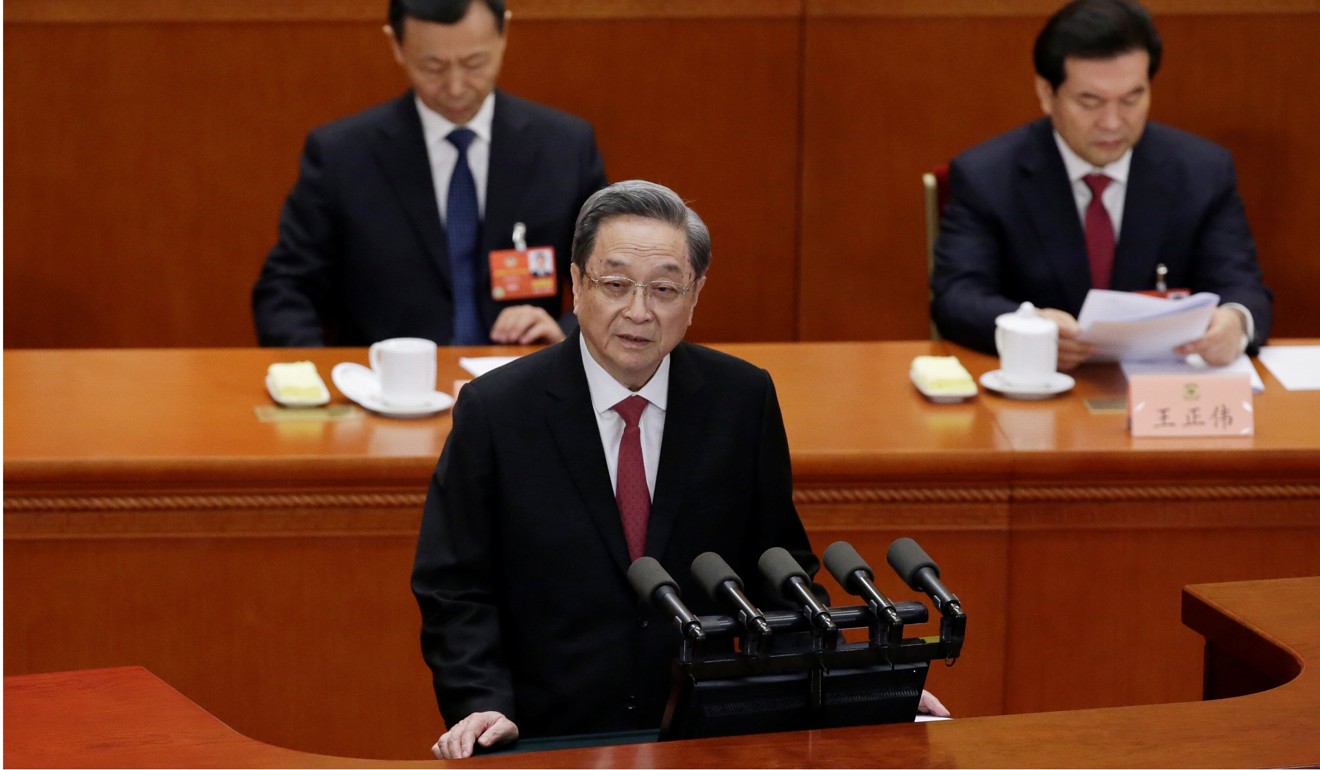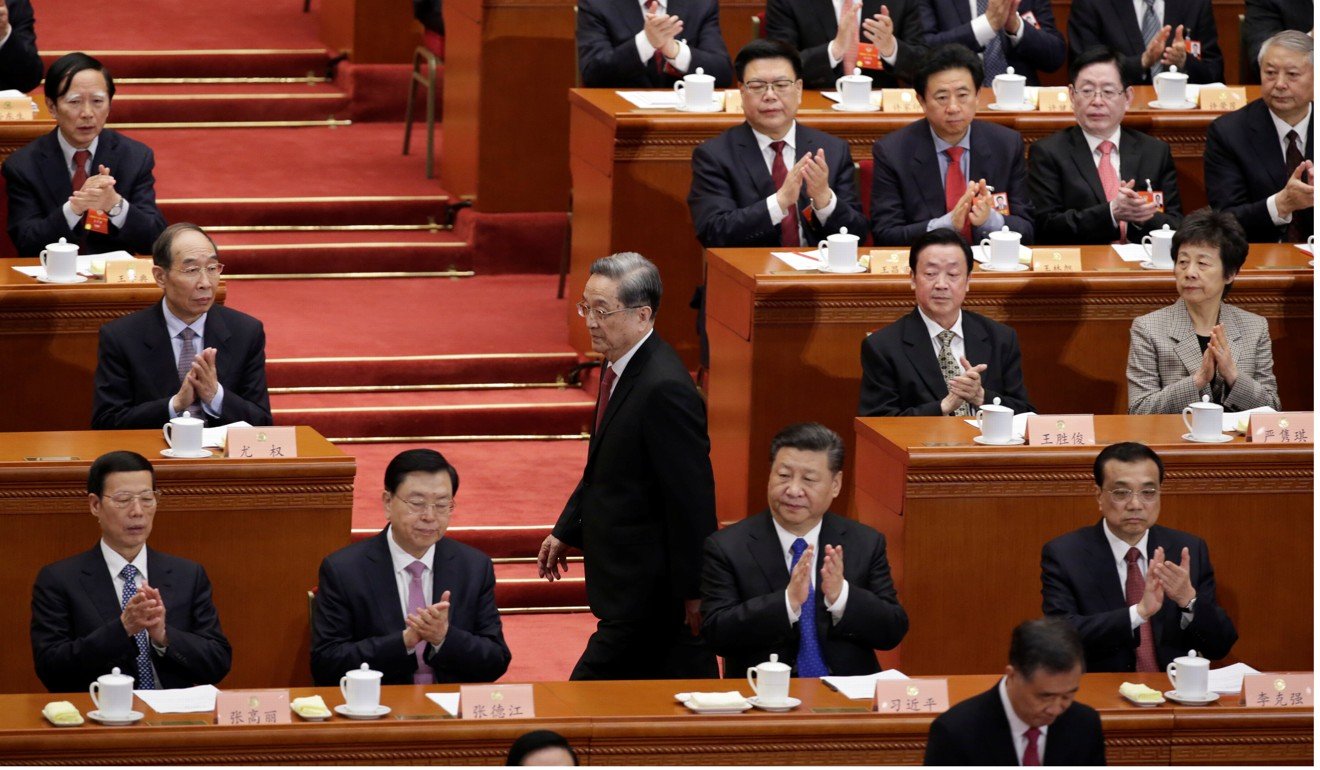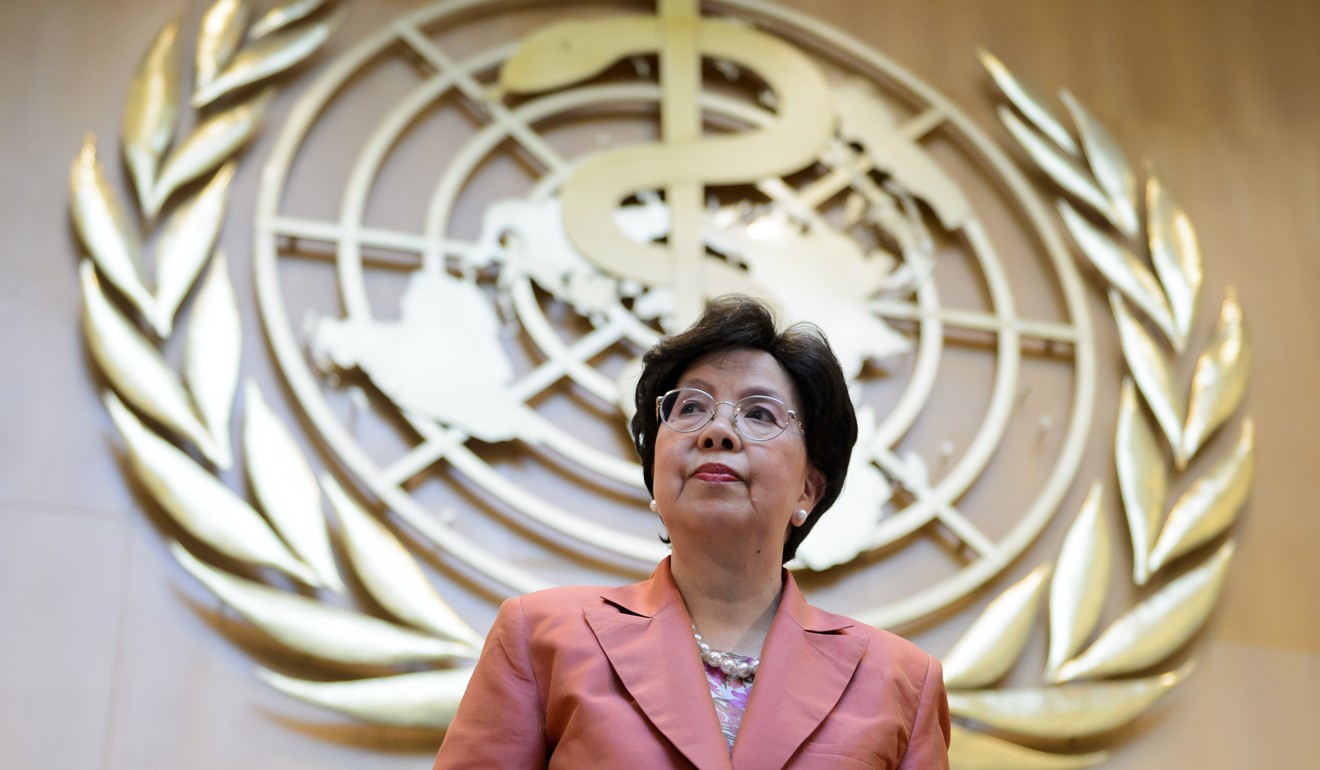
Praise for disqualification of Hong Kong pro-independence lawmakers at meeting of China’s top political advisory body
CPPCC chairman Yu Zhengsheng addresses 2,000 delegates and tells them body’s support for move to oust legislators was an achievement
The comment by Yu Zhengsheng, chairman of the Chinese People’s Political Consultative Conference, came as he delivered his five-year work report at the start of the nation’s three-week annual parliamentary sessions.
Yu, who is expected to step down from the position this month, was speaking at the opening of the CPPCC’s annual meeting inside Beijing’s Great Hall of the People.
The report comprised three parts: a review of the national body’s work in the last five years, his reflections, as well as suggestions for the future.

Hong Kong was only mentioned briefly, in the recommendations and review section, in which Yu said the CPPCC had worked “to bring together the will and strength of the people”.
That included “endorsing” the nation’s top legislative body, the National People’s Congress Standing Committee, in its interpretation of Hong Kong’s Basic Law in 2016.
What to watch for at China’s Two Sessions
The ruling related to Article 104 of the city’s mini-constitution and effectively disqualified two newly-elected members of Hong Kong’s legislature over improper oaths of office, after the pair inserted pro-independence slogans and insults against the nation into the declaration.
Four other pro-democracy legislators were also later removed from their seats by a local court for failing to take the oath properly.
“We implemented the ‘one country, two systems’ [principle] comprehensively and accurately, under which the people of Hong Kong govern Hong Kong ... [and] enjoy a high degree of autonomy,” Yu said.

“We supported [delegates] in playing a positive role in handling affairs in Hong Kong.”
How long does China’s President Xi Jinping plan to hold power? Here’s the magic number
“We were meticulous in our work related to the young people in Hong Kong and Macau, developing and strengthening the ranks of patriots who love both our country and their region,” he added.

This month’s annual CPPCC session is the first in the body’s 13th five-year term. It is expected to close on March 15, a day after the election of Yu’s successor.
Wang Yang, currently the No 4 member of the Communist Party’s ruling Politburo Standing Committee, is tipped to take over from Yu.
[We need] to mobilise all the sons and daughters of the Chinese nation to work together
In his recommendations for the future, Yu said the CPPCC needed to “deepen solidarity and friendship with our compatriots in Hong Kong, Macau and Taiwan, as well as with the overseas Chinese”.
“[We need] to mobilise all the sons and daughters of the Chinese nation to work together for the greater national interests and the realisation of the Chinese dream,” he added.
Several of the city’s delegates to the CPPCC said Yu’s brief mention of Hong Kong in his report did not mean it was unimportant.
CPPCC delegate Irons Sze Wing-wai said President Xi Jinping elaborated clearly his views on the directions for the city’s future development during his visit in Hong Kong last year, and Yu’s report followed the same line.
China’s top advisory body gains over 50 new Hong Kong faces
Meanwhile, on Friday night, Beijing’s liaison office in Hong Kong issued a statement saying it had held a meeting studying Xi’s speeches in the third plenary session of the party’s Central Committee.
“In his report, the general secretary talked about Hong Kong many times and fully affirmed the work of Hong Kong. We are greatly encouraged and motivated by this,” the statement read. “The ‘one country, two systems’ undertaking will have a very powerful impetus to move forward.”
It is the first revelation on how Hong Kong was mentioned in the plenary session.
The liaison office also called on Hong Kong NPC and CPPCC delegates to fulfil their responsibilities, ensuring the implementation of the central government’s policies in the city.
On Saturday afternoon, Hong Kong’s deputies to the NPC held a meeting with NPC vice-chairman Wang Chen.
According to Ma Fung-kwok, convenor of the Hong Kong delegation, Wang said the constitutional amendments to be tabled at the NPC were needed for the country’s long-term developments, but no specific details were given.
Among the changes was the proposal to scrap the two-term limit on the country’s president and vice-president, paving the way for Xi to stay in power beyond the end of his second term in 2023.
First term limits ... now Xi Jinping to shake up the state to tighten Communist Party’s grip on government
In line with tradition, more than 200 CPPCC delegates from Hong Kong and Macau were expected to meet a state leader the day after the session’s opening. In the last few years it has been NPC chairman Zhang Dejiang, the leader in charge of the two former colonies’ affairs. This year, some delegates believed, they would be meeting Wang instead.
In January about 200 Hongkongers were appointed CPPCC delegates, which included more than 50 fresh faces. Newcomers included former World Health Organisation head Dr Margaret Chan Fung Fu-chun as well as former Hong Kong officials, pro-establishment legislators and business leaders.
Tony Cheung and Phila Siu are reporting from Beijing



